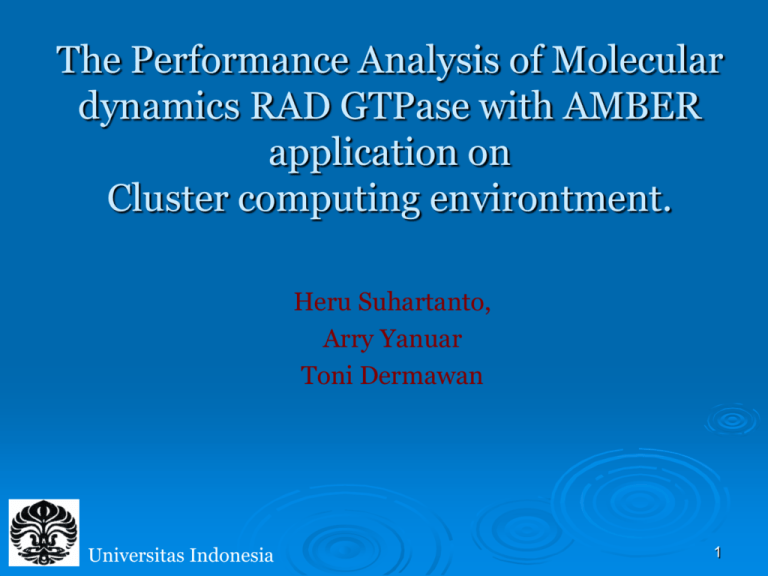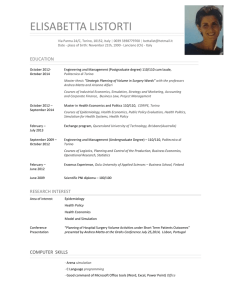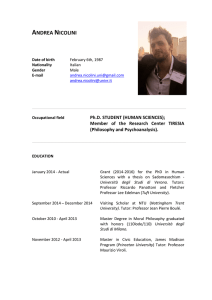Talk-Pragma20-vers3 - Fakultas Ilmu Komputer Universitas
advertisement

The Performance Analysis of Molecular dynamics RAD GTPase with AMBER application on Cluster computing environtment. Heru Suhartanto, Arry Yanuar Toni Dermawan Universitas Indonesia 1 Molecular Dynamics Simulation Computer Simulation Techniques Molecular Dynamic Simulation MD simulation on virus H5N1 [3] Fakultas Ilmu Komputer Universitas Indonesia 22 “MD simulation : computational tools used to describe the position, speed an and orientation of molecules at a certain time” Ashlie Martini [4] Fakultas Ilmu Komputer Universitas Indonesia 33 MD simulation purposes/benefits: Studying structure and properties of molecule Protein folding Drug design Sumber gambar: [5], [6], [7] Fakultas Ilmu Komputer Universitas Indonesia 44 Challenges in MD simulation •O(N2) time complexity •Timesteps (simulation time) Fakultas Ilmu Komputer Universitas Indonesia 55 Focus of the experiment •Study the effect of MD simulation timestep on the executing / processing time; •Study the effect of in vacum and implicit solvent technique with generalied Born (GB) model on the executing / processing time; •Study (scalability) how the number of processors improve executing / processing time; •Study how the output file grows as the timesteps increase. Fakultas Ilmu Komputer Universitas Indonesia 66 Scope of the experiments •Preparation and simulation with AMBER packages •Performance is based on the execution time of the MD simulation •No parameter optimization for the MD simulation Fakultas Ilmu Komputer Universitas Indonesia 77 Molecular Dynamics basic process [4] Fakultas Ilmu Komputer Universitas Indonesia 88 Flow of data in AMBER [8] 9 Flows in AMBER [8] Preparatory program LEaP is the primary program to create a new system in Amber, or to modify old systems. It combines the functionality of prep, link, edit, and parm from earlier versions. ANTECHAMBER is the main program from the Antechamber suite. If your system contains more than just standard nucleic acids or proteins, this may help you prepare the input for LEaP. 10 Flows in AMBER [8] Simulation SANDER is the basic energy minimizer and molecular dynamics program. This program relaxes the structure by iteratively moving the atoms down the energy gradient until a sufficiently low average gradient is obtained. PMEMD is a version of sander that is optimized for speed and for parallel scaling. The name stands for "Particle Mesh Ewald Molecular Dynamics," but this code can now also carry out generalized Born simulations. 11 Flows in AMBER [8] Analysis PTRAJ is a general purpose utility for analyzing and processing trajectory or coordinate files created from MD simulations MM-PBSA is a script that automates energy analysis of snapshots from a molecular dynamics simulation using ideas generated from continuum solvent models. 12 The RAD GTPase Protein RAD (Ras Associated with Diabetes) is a family of RGK small GTPase located inside human body with diabetes type 2. The crystal form of Rad GTPase has resolution of 1,8 angstrom. The crystal form of RAD GTPase is stored in d Protein Data Bank (PDB) file. Ref: A. Yanuar, S. Sakurai, K. Kitano, Hakoshima, dan Toshio, “Crystal structure of human rad gtpase of the rgk-family,” Genes to Cells, vol. 11, no. 8, pp. 961-968, Agustus 2006 13 RAD GTPase Protein Reading from PDB with NOC: The leap.log reading: number of atom Fakultas Ilmu Komputer Universitas Indonesia 2529 14 14 Parallel approach in MD simulation Algorithms data replication Data distribution Data for fungsi force: decomposition Particle decomposition Force decomposition Domain decomposition Interaction decomposition Fakultas Ilmu Komputer Universitas Indonesia 15 15 Parallel implementation in AMBER •Atoms are distributed among available processors (Np) •Each Execution nodes / processors compute force function •Updating position, computing parsial force, ect. •Write to output files Fakultas Ilmu Komputer Universitas Indonesia 16 16 Hastinapura Cluster Nama Head Node Worker Nodes Storage Node Sun Fire X2100 - Node Arsitektur Sun Fire X2100 Prosesor AMD Opteron AMD Opteron 2.2 Dual Intel Xeon 2.2 GHz (Dual GHz (Dual Core) 2.8 GHz (HT) Core) RAM 2 GB RAM 1 GB RAM 2 GB RAM Harddisk 80 GB 80 GB 3 x 320 GB Fakultas Ilmu Komputer Universitas Indonesia 17 17 Softwares Hastinapura Cluster 1 Functions Applications (versi) compilers gcc (3.3.5); g++ (3.3.5, GCC); g77 (3.3.5, GNU Fortran); g95 (0.91, GCC 4.0.3) 2 Aplikasi MPI 1 MPICH (1.2.7p1, Release date: 2005/11/04 11:54:51) 3 Operating system Debian/Linux OS (3.1 “Sarge”) 4 Resource management Globus Toolkit [2] (4.0.3) 5 Job scheduler Sun Grid Engine (SGE) (6.1u2) Fakultas Ilmu Komputer Universitas Indonesia 18 18 Experiment results Fakultas Ilmu Komputer Universitas Indonesia 19 Execution time with In Vacuum Waktu Jumlah prosesor simulasi (ps) 100 6.691,010 3.759,340 3.308,920 1.514,690 200 13.414,390 7.220,160 4.533,120 3.041,830 300 20.250,100 11.381,950 6.917,150 4.588,450 400 27.107,290 14.932,800 9.106,190 5.979,870 Fakultas Ilmu Komputer Universitas Indonesia 20 Execution time for In Vacuum Fakultas Ilmu Komputer Universitas Indonesia 21 Execution time for Implicit Solvent with GB Model Waktu Jumlah prosesor simulasi (ps) 100 112.672,550 57.011,330 29.081,260 15.307,740 114.733,30 200 225.544,830 0 58.372,870 31.240,260 172.038,61 300 400 337.966,750 452.495,000 0 87.788,420 233.125,33 116.709,38 0 0 Fakultas Ilmu Komputer Universitas Indonesia 45.282,410 60.386,260 22 Execution time for Implicit Solven with GB Model Fakultas Ilmu Komputer Universitas Indonesia 23 Execution time comparison between In Vacuum and Implicit Solvent with GB model Fakultas Ilmu Komputer Universitas Indonesia 24 The effect of Prosesor number on MD simulation with In Vacuum Fakultas Ilmu Komputer Universitas Indonesia 25 The effect of processors number at MD simulation with Implicit Solvent dengan Model GB Fakultas Ilmu Komputer Universitas Indonesia 26 Output file sizes as the simulation time grows – in vacum Simulation time - (ps) Number of processors and output file sizes 1 2 4 8 MB (Megabytes) 5,86 100 6.148.096 6.148.096 6.148.096 6.148.096 200 12.292.096 12.292.096 12.292.096 12.292.096 11,72 300 18.440.192 18.440.192 18.440.192 18.440.192 17,59 400 24.584.192 24.584.192 24.584.192 24.584.192 23,45 27 Output file sizes as the simulation time grows – Implicit solvent with GB model Jumlah prosesor Simulation time (ps) 100 200 300 400 1 6.148.096 2 6.148.096 4 6.148.096 8 6.148.096 Konversi ke MB (Megabytes) 5,86 12.292.096 12.292.096 12.292.096 12.292.096 11,72 18.440.192 18.440.192 18.440.192 18.440.192 17,59 24.584.192 24.584.192 24.584.192 24.584.192 23,45 28 Problems encountered Electrical supplies instabilities. Some nodes are not functioning during one or two experiments Another cluster with head node functions also as worker node: some nodes are not functioning / downs during some experiments. Fakultas Ilmu Komputer Universitas Indonesia 29 29 References [1]http://www.cfdnorway.no/images/PRO4_2.jpg [2]http://sanders.eng.uci.edu/brezo.html [3]http://www.atg21.com/FigH5N1jcim.png [4] A. Martini, “Lecture 2: Potential Energy Functions”, 2010, [Online]. Tersedia di: http://nanohub.org/resources/8117. [Diakses pada 18 Juni 2010]. [5]http://www.dsimb.inserm.fr/images/Binding-sites_small.png [6]http://thunder.biosci.umbc.edu/classes/biol414/spring2007/files/prote in_folding(1).jpg [7]http://www3.interscience.wiley.com/tmp/graphtoc/72514732/1189028 56/118639600/ncontent [8] D. A. Case et al., “AMBER 10”, University of California, San Francisco, 2008, [Online]. Tersedia di: http://www.lulu.com/content/paperbackbook/amber-10-users-manual/2369585. [Diakses pada 11 Juni 2010]. Fakultas Ilmu Komputer Universitas Indonesia 30 30




